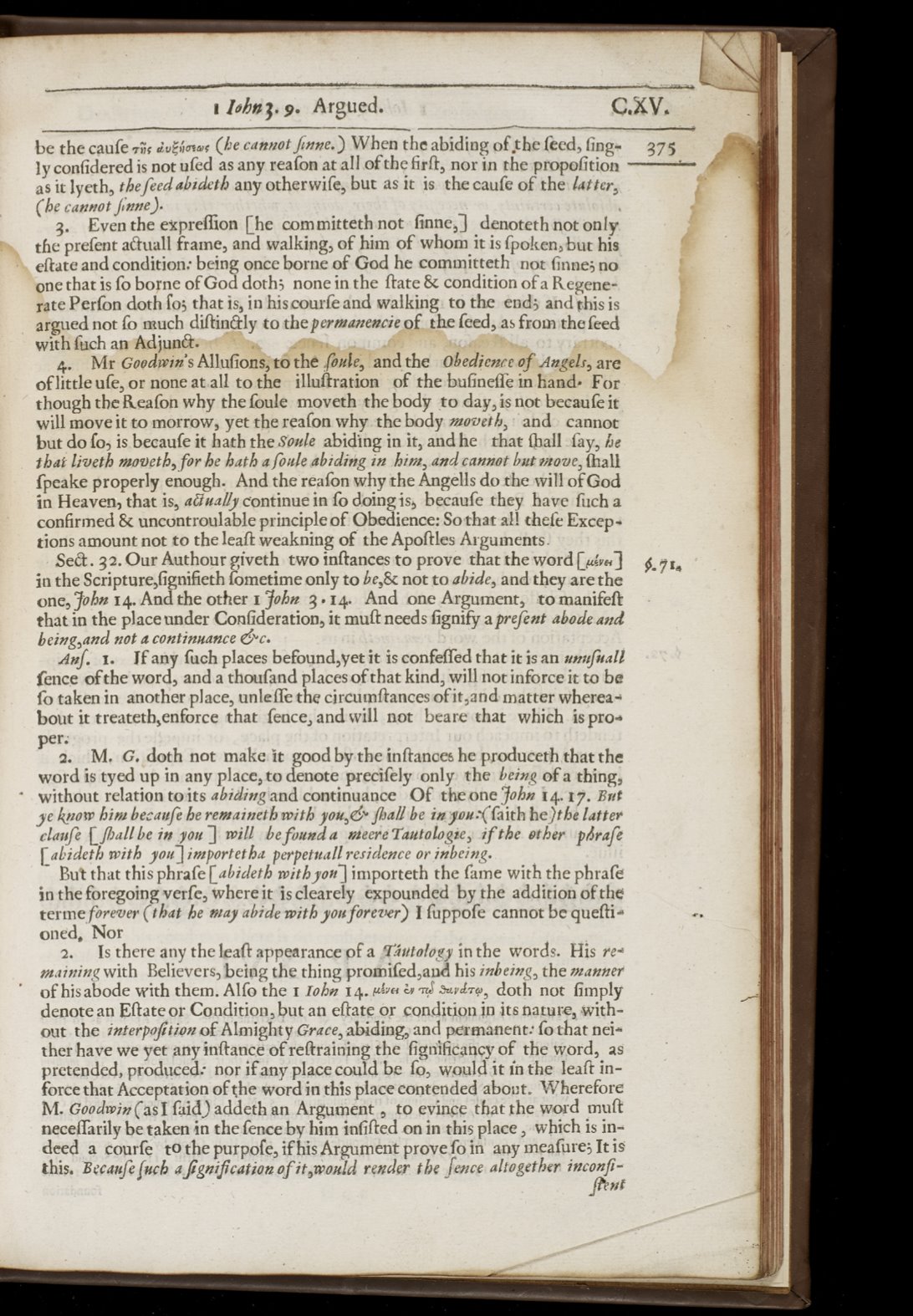

lohn3.9.
Argued.
be the
caufe
7
;4 ¿v
oams
(he
cannot
finne.) When the abiding
of
the
feed, ring.
ly confidered
is
not
ufed
as
any reafon
at
all
of
the
firft,
nor
in
the
propofition
as
it lyeth,
the
feed
abideth any
otherwife, but
as
it
is
the
caufe
of
the latter,
(he
cannot
f,nne).
3.
Even
the exprefiion
[he
corn
mitteth not finne,] denoteth not
only
the
prefent
a&uall
frame,
and walking,
of
him
of
whom it
is
fpoken,but
his
eftate and
condition: being
once
borne
of
God he
com
mitteth not
finne;
no
one
that
is
fo
borne
of
God
doth5
none
in
the
ftate & condition
of
a
Regene-
rate Perfon
Both fo;
that
is
in
his courfe and walking
to
the
ends and
this
is
argued not
fo
much
diftinttly
to
the
permanencie
of
the
feed,
as
from
the
feed
with
fuch an
Adiunét.
4.
Mr
Goodwin's
Allufions,
to
the
,
foule,
and the
Obedience
of
Angels,
are
oflittle
ufe,
f
or
none at all
to
the illuftration
of
the
buneffe
in
hand. For
though the
why
the
foule
moveth the body
to
day,
is
not
becaufe it
will
move
it
to
morrow, yet the
reafon why
the
body
moveth,
and cannot
but
do fo,
is
becaufe it
bath the
Soule
abiding
in it,
and
he
that
than
fay,
he
that
liveth moveth, for
he
hath
a
foale,abiding
in
him,
and
cannot but move,
Chaff
fpeake properly enough.
And
the
reafon why
the
Angelis
do
the
will
of
God
in Heaven,
that
is, allually
continue
in fo
doing is, becaufe they have
fuch
a
confirmed &
uncontroulable
principle
of
Obedience:
So
that
all
thefe Excel).
tions amount not
to
the
leaft weakning
of
the
Apoftles
Arguments.
Sea.
32.
Our
Authour giveth
two
inftances
to
prove
that
the
word
[u:ve.]
in
the
Scripture,fignifieth
fometime only
to
be,&
not
to
abide,
and they
are the
one,
John
14.
And
the
other
a
John
3.14.
And one Argument,
to
manifeft
that
in
the
place
under Confideration, it muft
needs
fìgnify aprefent
abode
and
being,and
not
a
continuance
&c.
Anf.
I.
If
any fuch places
befound,yet
it
is
confeffed
that
it
is
an
unufuall
fence
ofthe
word, and
a
thoufand
places
of
that
kind,
will
not inforceit to be
fo
taken
in
another
place, unleffe
the circumftances
ofit,and
matter wherea.
bout it treateth,enforce
that
fence,
and
will
not
beare
that
which
is
pro..
r
2.
M.
G.
doth not
make
it
good by
the
inftances he
produceth
that the
word
is
tyed up
in any
place,
to denote
precifely only
the
being
of
a
thing,
without relation to
its
abiding
and
continuance
Of
the
one john
14.
r7.
But
ye
know
him
becaufe he
remaineth with
you,4:°
fhall
be
in
ynu.(faith he)the latter
claufe
[
fhall
be
in
you]
will
be
found a
meereTautologie,
if
the other phrafe
[abideth
with
you]importetha
perpetuall residence or inbeing.
But
that this
phrafe[abideth
with
yon] importeth
the
fame
with
the
phrafe
in
the
foregoing verfe, where
it
is
clearely expounded by
the
addition
of
the
terme
forever
(that
he may
abide
with
you
forever)
I
fuppofe cannot
be
quefli'
oned,
Nor
2.
Is
there
any
the
leaft appearance
of
a
ttáutology in
the
words.
His
re'
maining
with
Believers,
being the thing promifed,and
his inbeing,
the
manner
of
his
abode with them.
Alfo
the t
lohn 14.
e+N
¿
ir,S
as
ars',
doth not
limply
denote
an
Pate
or
Condition,
but
an eftate
or condition
in
itsnature, with-
out the
interpofition
of
Almighty
Grace,
abiding,
and permanent:
fo
that
nei-
ther have
we
yet
any inftance
of
reftraining
the
fignificancy
of
the word,
as
pretended, produced: nor
if
any
place could be
fo,
would
it
in
the
leaft
in-
force
that
Acceptation
ofthe
word
in this place
contended about. Wherefore
M.
Goodwin
(as I faid)
adder,
an
Argument ,
to
evince
that
the
word
muff
necelfarily be
taken in the
fence
by him inCíted
on
in
this place
,
which
is
in-
deed
a courfe
to
the
purpofe,
if
his
Argument
prove
fo in any
tneafnre;
It
is
this.
Becaufe
fach afignification
of
it,Would
render the fence
altogether inconfi-
fl'ent










